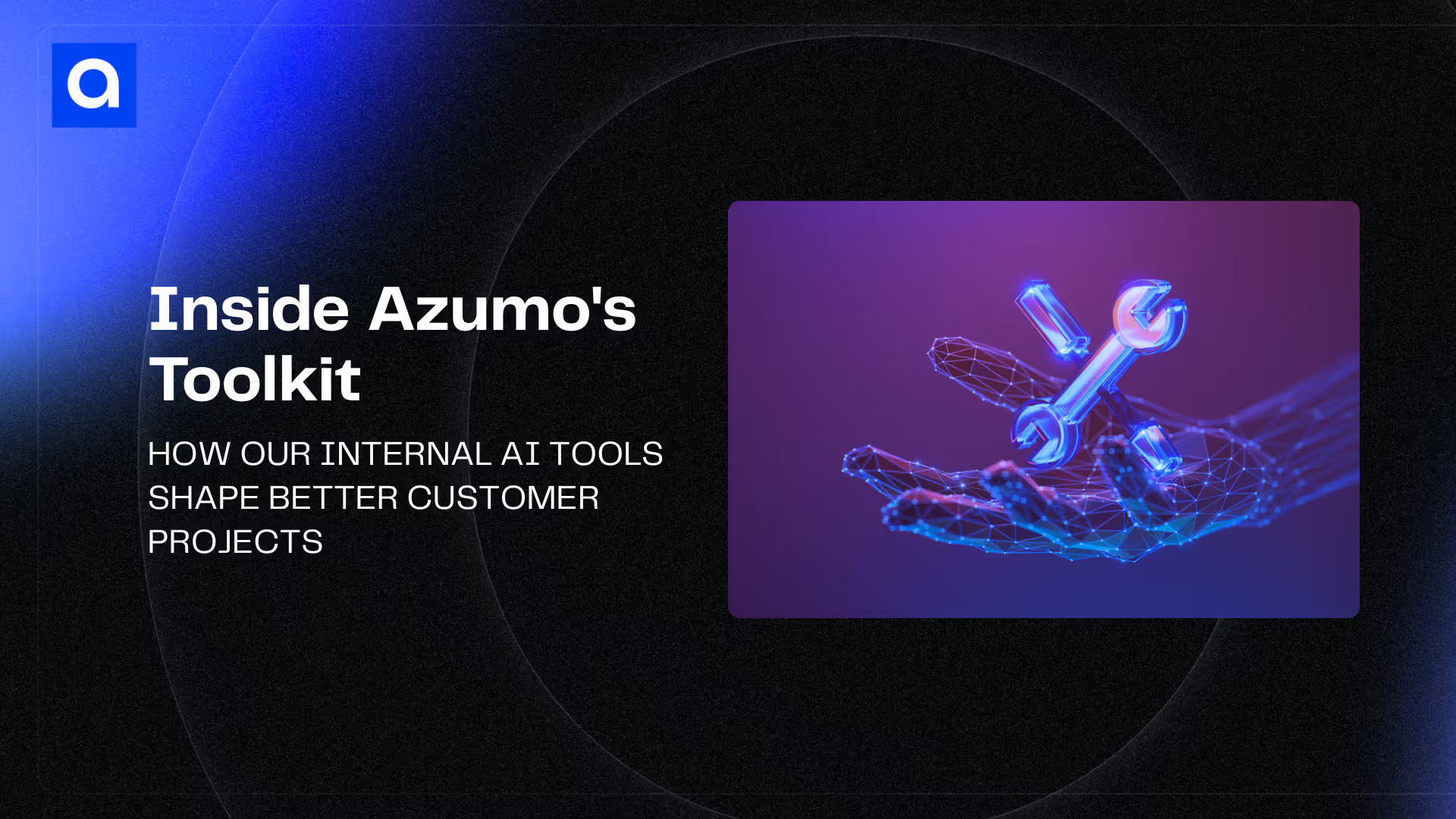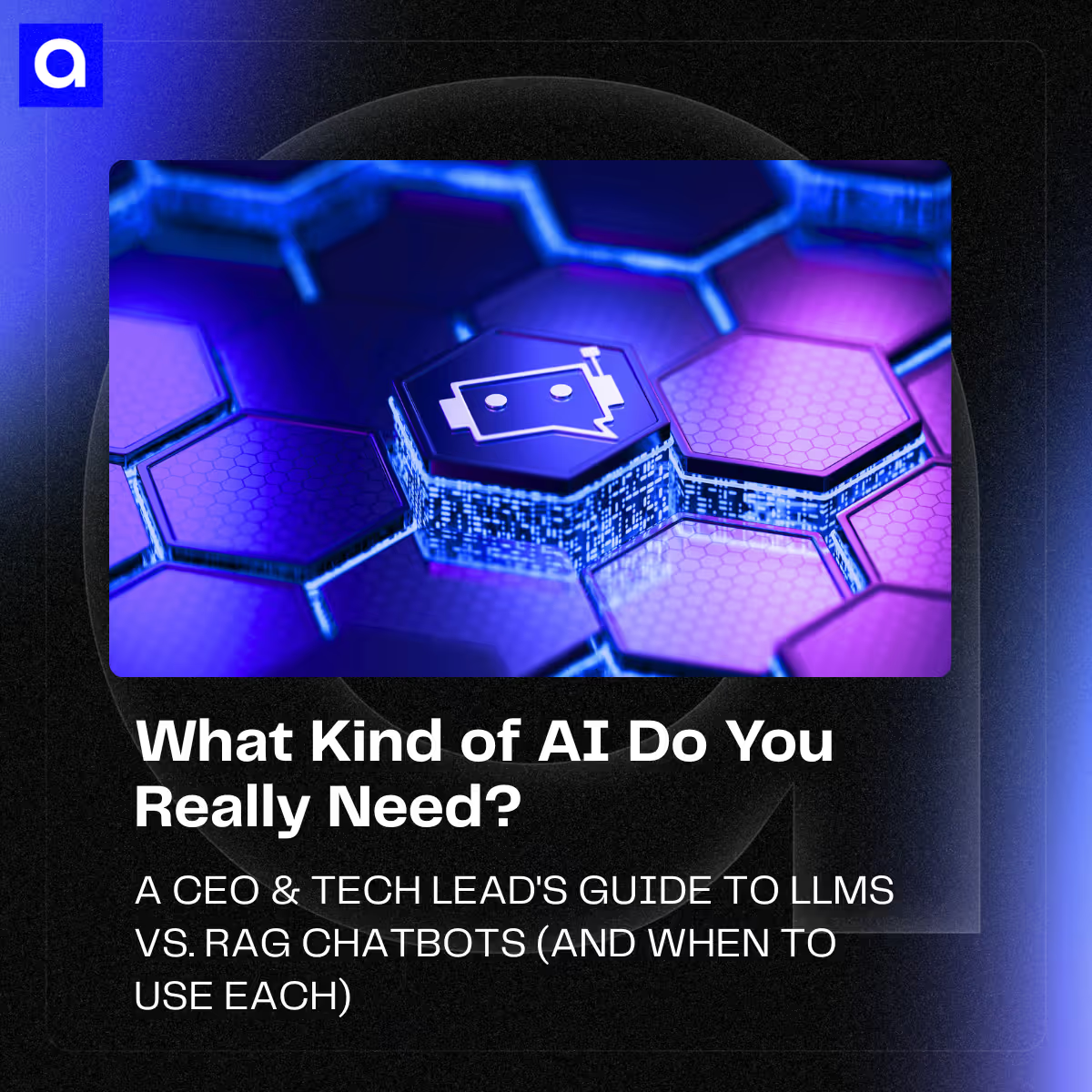
When enterprise clients walk through our doors at Azumo, they often ask the same question: "What gives you an edge in delivering AI-infused projects?" Sure, they expect to hear about methodology and talent, but what really sets us apart is something they rarely see: the internal AI tools we've built and use every single day. Think of it as our secret sauce for delivering higher quality, more agile, and more strategic outcomes.
Today, I'm pulling back the curtain to show you exactly how our internal AI toolkit works and why it matters for your next AI initiative.
The Real Challenge: Why AI Projects Get Stuck
Here's the truth about AI for business: it's definitely not plug-and-play. Even the most well-intentioned teams run into the same recurring headaches:
- Data chaos: Trying to align disparate data models across different systems feels like solving a puzzle with missing pieces
- Scope creep: Accurately assessing feasibility and risk before you're knee-deep in development
- Consistency problems: Maintaining standards in prompt design, model orchestration, and guardrails across team members
- Quality control: Ensuring reliability and auditability as projects evolve through iterations
- Reinventing the wheel: Starting from scratch for each client instead of building on proven foundations
These friction points invite errors and inflate costs, and as AI adoption accelerates, clients rightfully expect nimble, trustworthy execution.
The tension is real: how do you maintain engineering rigor and governance while still enabling creative exploration? Our answer? We eat our own dog food. Our internal tools are the core infrastructure that helps us prototype faster, standardize best practices, catch problems early, and scale client-tailored solutions efficiently.
What's In Our Toolkit: Our Complete AI Arsenal
Rather than building AI projects from scratch each time, we've developed a comprehensive suite of internal tools that accelerate delivery, enforce best practices, and reduce risk. Here's our complete toolkit:
Valkyrie: Infinite AI Compute on Demand
Purpose: Eliminate infrastructure bottlenecks for agentic AI workflows
Our flagship internal platform provides unlimited compute capacity for running any AI model, script, or workflow without the typical infrastructure headaches. Valkyrie enables our teams to:
- Run concurrent variant testing and prompt experiments at scale
- Execute scenario-based stress tests across multiple model configurations
- Orchestrate complex agentic workflows without capacity constraints
- Compare outputs side-by-side with automated performance metrics
%2011.52.50%E2%80%AFa.%C2%A0m..avif)
Client Impact: We can prototype and iterate 3-5x faster than traditional approaches, compressing weeks of experimentation into days.
AI Schema Generator: Structured Data Made Simple
Purpose: Rapidly define and generate structured schemas, data contracts, and interfaces
This tool transforms business requirements into production-ready schema artifacts in minutes rather than hours. It eliminates the tedious manual work of:
- Aligning disparate data models across different systems
- Creating consistent API contracts and data structures
- Generating validation rules and type definitions
- Maintaining schema versioning and documentation
%2011.54.56%E2%80%AFa.%C2%A0m..avif)
Client Impact: Reduces schema design time by 70% while dramatically improving consistency and reducing human error in data architecture.
AI Readiness Assessment: Pre-Flight Validation
Purpose: Assess client readiness, risk, and scope viability before development begins
Before a single line of code is written, this framework evaluates:
- Data quality and maturity levels
- Infrastructure readiness and technical debt
- Organizational alignment and change management capacity
- Model fit and feasibility for proposed use cases
%2011.56.10%E2%80%AFa.%C2%A0m..avif)
Client Impact: Sets realistic expectations upfront, identifies blockers early, and provides a data-driven foundation for project planning and stakeholder alignment.
Charlibot: Conversational AI Platform
Purpose: Rapid deployment of domain-specific chatbots and conversational interfaces
Our white-label chatbot platform allows us to create generative AI chatbots trained on client-specific content in minutes. Key capabilities include:
- Training on websites, documents, and PDFs
- Handling customer support, research assistance, and information retrieval
- Customizable branding and conversational flows
- Built-in guardrails and response monitoring
%2011.58.27%E2%80%AFa.%C2%A0m..avif)
Client Impact: Demonstrates conversational AI capabilities quickly during discovery, and serves as a foundation for custom chatbot implementations.
AI Software Spec Writer: Requirements Automation
Purpose: Transform conversations into structured Software Requirements Specifications (SRS)
This tool converts natural language discussions into formal requirement documents, helping us:
- Capture and structure client requirements efficiently during discovery
- Maintain consistency in requirement documentation
- Generate baseline specifications that teams can refine collaboratively
- Reduce misalignment between business needs and technical specifications
%2011.59.28%E2%80%AFa.%C2%A0m..avif)
Client Impact: Accelerates the requirements gathering phase and ensures nothing gets lost in translation between business stakeholders and technical teams.
AI Road Map Consultation Bot: Strategic Planning Assistant
Purpose: Guide clients through AI strategy and implementation planning
This conversational tool helps clients think through their AI roadmap by:
- Asking targeted questions about business objectives and constraints
- Suggesting phased implementation approaches
- Identifying quick wins vs. long-term strategic initiatives
- Tailoring recommendations to specific industry contexts and maturity levels
%2012.00.41%E2%80%AFp.%C2%A0m..avif)
Client Impact: Provides clients with a structured framework for thinking about AI adoption, helping prioritize initiatives that deliver maximum business value.
Supporting Tools & Demonstrations
Beyond our core internal toolkit, we've built several demonstration applications that showcase our capabilities:
- Find My College: A conversational app that matches students with suitable colleges based on preferences and requirements—demonstrating multi-criteria decision support
- HealthyScreen: A daily health screening tool used over 1 million times—proving our ability to build reliable, scalable AI-powered applications for real-world deployment
- Azumo Project Pricing Estimator: An AI-powered tool that provides accurate project estimates based on requirements—showcasing our expertise in requirements analysis and cost modeling
The Integration Advantage
These tools aren't siloed utilities—they work together as an integrated system throughout our delivery lifecycle. The AI Readiness Assessment informs our schema design. Valkyrie powers our variant testing. Charlibot demonstrates conversational patterns we then customize. The Spec Writer feeds into our project planning. Every tool amplifies the others, creating a multiplier effect on quality and velocity.
Why This Approach Works: The Strategic Advantages
You might be wondering, "Why invest so heavily in internal tooling?" The gains show up across multiple dimensions:
- Consistency and governance baked in: Instead of relying on ad hoc scripts each time, our tools enforce consistent prompt templates, schema versioning, data contracts, and guardrails. This dramatically reduces human error and strengthens auditability—crucial when you're dealing with enterprise-grade requirements.
- Faster prototyping with safe exploration: We can spin up variant tests quickly, compare outputs side by side, and detect regression or drift early. This means creative prompt iterations can happen without the costly manual overhead that usually slows teams down.
- Scalable reuse across clients: Rather than reinventing base building blocks for each project, our toolkit helps us modularize core AI patterns (like summarization, entity extraction, classification) and adapt them more efficiently to each client's specific needs.
- Transparent client engagement: We can show clients internal readiness scores, scenario test results, and confidence metrics. This builds trust and helps clients make more informed tradeoff decisions throughout the project.
- Lower risk, higher velocity: Because key sanity checks, guardrails, and validation logic are automated, fewer nasty surprises surface late in the process. We maintain agility without sacrificing quality.
These advantages are crucial in today's climate where AI investments absolutely must deliver tangible outcomes. According to McKinsey's 2024 State of AI survey, 65% of enterprises are now regularly using generative AI but leaders are increasingly focused on mitigating accuracy risks in deployment.
Meanwhile, Deloitte's State of Generative AI report shows that responsible scaling through governance and monitoring remains among the top challenges for mature enterprise adoption.
How It Works in Practice: From Discovery to Deployment
Let me walk you through how these internal tools actually integrate into real client projects:
- Discovery & Kickoff: We start every engagement by running our AI Readiness Assessment with key stakeholders. This evaluates data quality, infrastructure maturity, and organizational alignment giving everyone a realistic baseline. Simultaneously, we use our schema generator to draft an initial domain model and prototype small integrations with sample prompts for early validation.
- Rapid Prototyping: Here's where our variant orchestration really shines. Multiple candidate prompts get tested concurrently while scenario-based guardrail checkpoints simulate edge cases and potential toxic outputs. Our internal dashboards show comparative metrics—coherence, hallucination risk, latency, so decisions are data-driven rather than based on gut feel.
- Iteration & Feedback: As models evolve, we automatically re-run drift and regression tests to ensure no changes break earlier guarantees. The schema logic adapts through automated transformations, and clients can view an internal scorecard of tradeoffs (precision vs. recall vs. latency) to guide their adjustment decisions.
- Handoff & Monitoring: We don't just deliver models and APIs, we also provide toolkit exports including prompt suites, schema definitions, and monitoring code. Clients receive the same internal dashboards we use to monitor performance, drift, and anomalies post-launch.
- Post-Launch Refinement: Because our tools are extensible, we can add new prompt modes or domains without starting from zero. As client feedback comes in, we test updates against benchmark cases automatically.
We often pair our internal tools with public-facing offerings. For example, our AI Schema Generator on Azumo's site demonstrates how schema-first thinking underpins effective AI workflows. Our AI Readiness Assessment mirrors the logic we use internally to qualify project viability. And Valkyrie provides a glimpse into our scenario orchestration and prompt stress-testing capabilities.
What's Next: The Future of AI Tooling
Looking ahead, our roadmap includes several exciting developments:
Domain-specific models: We're moving beyond generic models toward vertical-tailored LLMs. This aligns with Gartner's forecast that domain-specific AI will dominate enterprise adoption, with the market projected to reach $11.3 billion by 2028.
Autonomous orchestration & agent frameworks: We're embedding more agentic coordination so our internal tools can self-suggest prompt pipelines and fallback strategies while still respecting governance requirements.
Enhanced explainability & governance modules: Expanding integrated bias detection, provenance logs, and user-facing explanations. In today's regulatory environment, responsible AI isn't optional—it's table stakes.
Marketplace of composable capabilities: Eventually allowing clients (and our own teams) to "plug and play" common AI modules from our internal library, accelerating time to value.
Seamless ecosystem integration: Ensuring smooth handoffs between our internal tooling, client tech stacks, MLOps systems, and observability layers.
The ultimate goal? Keep raising the bar on what's possible and help clients consume not just AI output, but AI-powered delivery intelligence.
Ready to See the Difference?
You've now seen how Azumo's internal AI toolkit isn't just a side project it's the foundational infrastructure behind reliable, scalable, and high-impact AI delivery. By automating governance, enabling prompt experimentation, standardizing schemas, and providing transparent metrics, these tools elevate every client engagement.
If your business is evaluating AI project partners or considering building your own internal AI capabilities, I invite you to see our approach in action. Visit our AI Readiness Assessment tool to explore where your organization stands today and how state-of-the-art internal tooling can become your competitive advantage.
Let's build AI delivery that's not only smart but predictable, trustworthy, and scaled for lasting business impact.


.avif)
